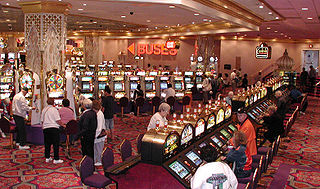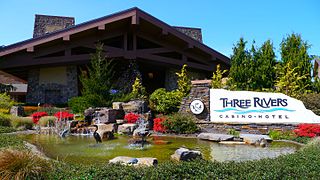
Native American gaming comprises casinos, bingo halls, and other gambling operations on Indian reservations or other tribal lands in the United States. Because these areas have tribal sovereignty, states have limited ability to forbid gambling there, as codified by the Indian Gaming Regulatory Act of 1988. As of 2011, there were 460 gambling operations run by 240 tribes, with a total annual revenue of $27 billion.

Jai alai is a sport involving bouncing a ball off a walled-in space by accelerating it to high speeds with a hand-held wicker cesta. It is a variation of Basque pelota. The term jai alai, coined by Serafin Baroja in 1875, is also often loosely applied to the fronton where matches take place. The game, whose name means "merry festival" in Basque, is called cesta-punta in the Basque Country. The sport is played worldwide, but especially in Spain, France, and in various Latin American countries.

Foxwoods Resort Casino is a hotel and casino complex owned and operated by the Mashantucket Pequot Tribal Nation on their reservation located in Ledyard, Connecticut. Including six casinos, the resort covers an area of 9,000,000 sq ft (840,000 m2). The casinos have more than 250 gaming tables for blackjack, craps, roulette, and poker, and have more than 5,500 slot machines. The casinos also have several restaurants, among them a Hard Rock Cafe. It has been developed since changes in state and federal laws in the late 20th century enabled Native American gaming on the sovereign reservations of federally recognized tribes.

In the United States, a sportsbook or a race and sports book is a place where a gambler can wager on various sports competitions, including golf, football, basketball, baseball, ice hockey, soccer, horse racing, greyhound racing, boxing, and mixed martial arts. The method of betting varies with the sport and the type of game. In the US, the Professional and Amateur Sports Protection Act of 1992 allowed only Nevada, Oregon, Montana, and Delaware to legally wager on sports other than horse racing, greyhound racing, and jai alai; the law was ruled unconstitutional on May 14, 2018, freeing states to legalize sports betting at their discretion.

Mohegan Sun is an American casino, owned and operated by the Mohegan Tribe on 240 acres (97 ha) of their reservation, along the banks of the Thames River in Uncasville, Connecticut. It has 364,000 square feet of gambling space.

In the United States, gambling is subject to a variety of legal restrictions. In 2008, gambling activities generated gross revenues of $92.27 billion in the United States.
A daily double is a parimutuel wager offered by horse and dog racing tracks in North America. Bettors wager on the winners of two races, pre-designated by the track for a particular race day. The Daily Racing Form's glossary defines a daily double as two consecutive races.. Because of the increased difficulty of picking two straight winners, winning daily double bets pay off at higher odds than betting both horses to win, or even parlaying them, due to the lack of a second win takeout. The daily double is usually the first two races on the card, but most racetracks have now included a "late daily double"

Light & Wonder, Inc., formerly Scientific Games Corporation (SG), is an American corporation that provides gambling products and services. The company is headquartered in Las Vegas, Nevada.

The Connecticut Lottery Corporation, also called the CT Lottery, is the official lottery in Connecticut. It was created in 1971 by then-Gov. Thomas Meskill, who signed Public Act No. 865. The first tickets were sold on February 15, 1972. The Connecticut Lottery offers several in-house drawing games; Connecticut also participates in Mega Millions and Powerball; each are played in 44 states, the District of Columbia, and the U.S. Virgin Islands.

Gambling in Oregon relates to the laws, regulations, and authorized forms of gambling.

Bally's Twin River Lincoln Casino Resort, previously Twin River Casino Hotel, is a casino, hotel, and former race track in Lincoln, Rhode Island, owned and operated by Bally's Corporation. The facility has 202,000 square feet (18,800 m2) of gaming space, with 4,108 slot machines, 97 table games, and 23 poker tables. The hotel has 136 rooms. Other amenities include a 29,000-square-foot (2,700 m2) event center, 16 eateries, 7 bars, and a racebook.
Legal forms of gambling in the U.S. state of North Carolina include the North Carolina Education Lottery, three Indian casinos, charitable bingo and raffles, and low-stakes "beach bingo". North Carolina has long resisted expansion of gambling, owing to its conservative Bible Belt culture.
Legal forms of gambling in the U.S. state of Texas include the Texas Lottery; parimutuel wagering on horse and greyhound racing; limited charitable bingo, limited charitable raffles, and three Indian casinos. Other forms of gambling are illegal in Texas.
Instant Racing, known generically as historical race wagering, is an electronic gambling system that allows players to bet on replays of horse races or dog races that have already been run. Some Instant Racing terminals resemble slot machines.
Gambling in the Philippines has been present in the country since at least the sixteenth century. Various legal and illegal forms of gambling are found almost all over the archipelago. The government manages gambling through the Philippine Amusement and Gaming Corporation (PAGCOR) a state-owned enterprise which both operates a number of individual casinos and in turn acts as a regulator to privately owned casino operators. Since 2016 PAGCOR has also granted operating licenses and overseen the regulation of growing online gambling sector serving offshore markets. Casino gambling and integrated resorts have become a key component of the Philippines appeal as a tourist destination with more than twenty casinos found in Metro Manila alone.

Gambling in Metro Manila has been regulated since 1976 when the Philippine Amusement and Gaming Corporation (PAGCOR) was created through Presidential Decree 1067. Under its charter promulgated in 1983, the 100% state-owned PAGCOR, running under the direct supervision of the Office of the President, serves three crucial roles: to regulate and operate all games of chance in the country, particularly casino gaming; generate funds for the government's infrastructure and socio-civic projects; and boost local tourism.
Legal forms of gambling in the U.S. state of Massachusetts include casinos, sports betting, parimutuel wagering on horse racing, the Massachusetts Lottery, and charitable gaming. The Massachusetts Gaming Commission regulates commercial operations under state jurisdiction.

Legal forms of gambling in the U.S. state of California include cardrooms, Indian casinos, the California State Lottery, parimutuel wagering on horse racing, and charitable gaming. Commercial casino-style gaming is prohibited.
Legal forms of gambling in the U.S. state of Maine include parimutuel wagering on horse races, the Maine Lottery, two casinos, and charitable gaming.
Legal forms of gambling in the U.S. state of New Hampshire include the New Hampshire Lottery, sports betting, parimutuel wagering, and charitable gaming. The state's Gaming Regulatory Oversight Authority (GROA) is part of the New Hampshire Lottery Commission, which also maintains an Investigative & Compliance Division.












